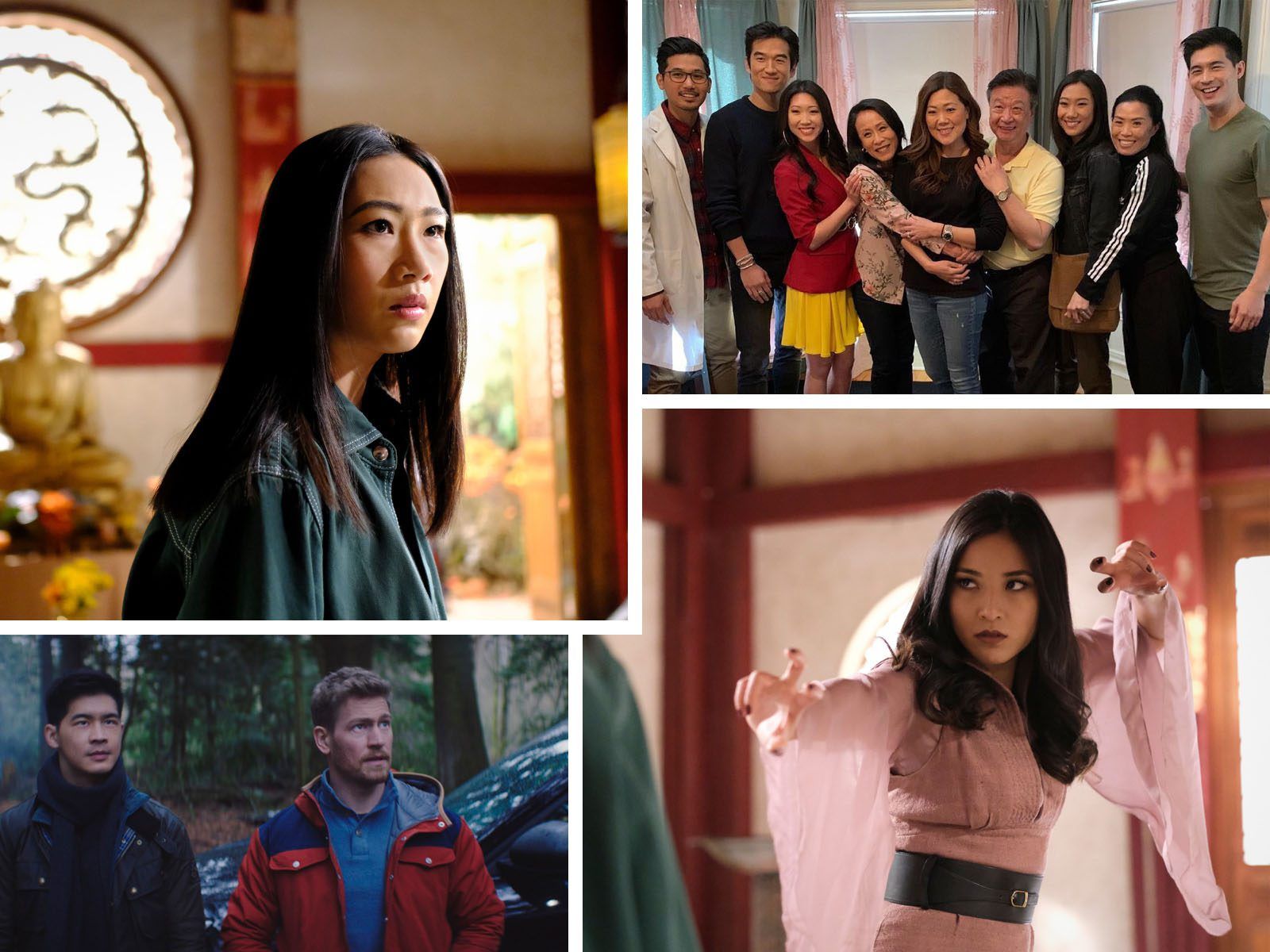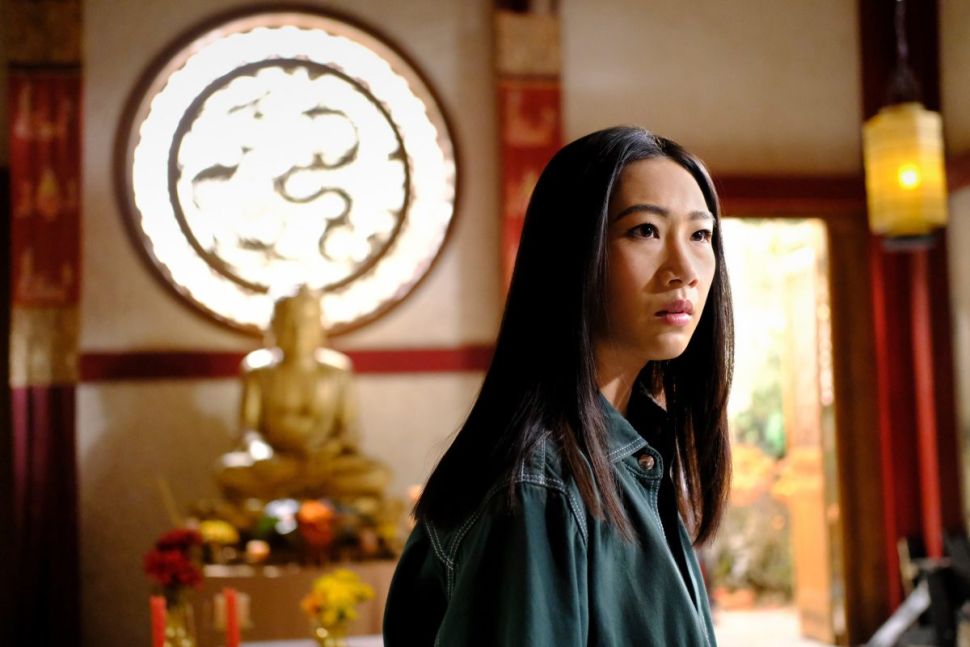
Olivia Liang as Nicky Shen in the Season 1 finale, “Transformation.†Bettina Strauss/The CW
The following interview contains spoilers for the entire first season of Kung Fu.
When Kung Fu showrunners Christina M. Kim and Robert Berens first mapped out the arc of their 13-episode first season, they knew they wanted to go out with a bang. But as the COVID-19 pandemic worsened, they both realized that the journey to the “big, epic, mind-blowing finale†was going to be far from straightforward.
“It always felt right that Nicky was gonna go back to China, go back to the monastery, but go back as a completely different person, with all of her experiences from the season,†Kim told Observer in an exclusive roundtable interview with the cast and producers after last week’s season one finale.
After engaging in an international game of cat-and-mouse for eight enchanted weapons, Nicky (Olivia Liang) and Zhilan (Yvonne Chapman) returned to the battlegrounds of their fateful first encounter to access an ancient forge of å˜é© (bià n gé), the green-glowing force that powers the ancient weapons and could cause great destruction if ever wielded by one person. When they discover that the last sorcerer has taken the source of bià n gé to a remote mountainside, the two archnemeses — along with Nicky’s boyfriend, Henry (Eddie Liu) — race to the sorcerer’s side, only to discover that she has been stabbed by Russell Tan (Kee Chan), a wealthy and powerful businessman who hopes that all of the power will return to the weapons.
Instead, the energy possesses both Nicky and Zhilan, knocking both of them out and placing them in an alternate universe where bià n gé — which is Chinese for “transformation†— does not exist. What ultimately ensues when they both wake up from an emotional conversation with Pei-Ling (Vanessa Kai) is another death-defying battle, in which Nicky gains the upper hand and releases bià n gé back out into the world. But when she is given the opportunity to kill Zhilan, who insists that she has nothing — and no one — left after sacrificing everything to wield bià n gé, Nicky walks away, showcasing the contrast between two young women who walked similar, but divergent paths.
“So much changed over the course of the season, partly because of shooting during a pandemic and just adapting to what was working as we went through the season,†Berens says. “Funnily, I think we end up in a lot of the same places that Christina and I had discussed at the beginning. But certain pieces of it were very late in the process, like the bià n gé dream was a last-minute conception that really lit us up and got us excited as we were breaking the finale.â€
In Observer’s first-ever Twitter Spaces interview, the cast and showrunners of Kung Fu reflected on the biggest storylines of the season, culminating in last Wednesday’s explosive finale, and previewed the show’s highly-anticipated second season, which is set to debut in early 2022. Here are edited excerpts from the hour-long conversation:
Observer: Olivia and Yvonne, how would you say the versions of Nicky and Zhilan that we met in the pilot compared to the ones that we see in the season finale?
Olivia Liang: The episode is titled “Transformation,†and if you look back on the entirety of the season, you see Nicky start at one place in the monastery where a tragedy strikes and she loses her mentor and is just aimless and lost. She returns back to that place with so much more purpose, with so much more grit, and it’s really fun to see that.
https://www.youtube.com/watch?v=ZK9E5iel_M4
And by the end of the season, we’ve seen Nicky be so headstrong and single-minded with Zhilan and getting the eight weapons and avenging Pei-Ling. But at the end of it, she just wants to get boba, and I love it. It’s nothing serious, it’s nothing dire, it’s not life-and-death. She is just ready to go and have a date with her boyfriend, and that felt like a nice thing to end the season on.
Yvonne Chapman: Well, Zhilan does not get boba. (Laughs.) With Nicky having this determination, grit and purpose at the end, for Zhilan, it’s the complete opposite. She had that at the beginning, and now at the end, she’s completely lost. She doesn’t know who she is or what she’s doing anymore. There were similar journeys, obviously, of what they were going after, but completely different conclusions for both of them.
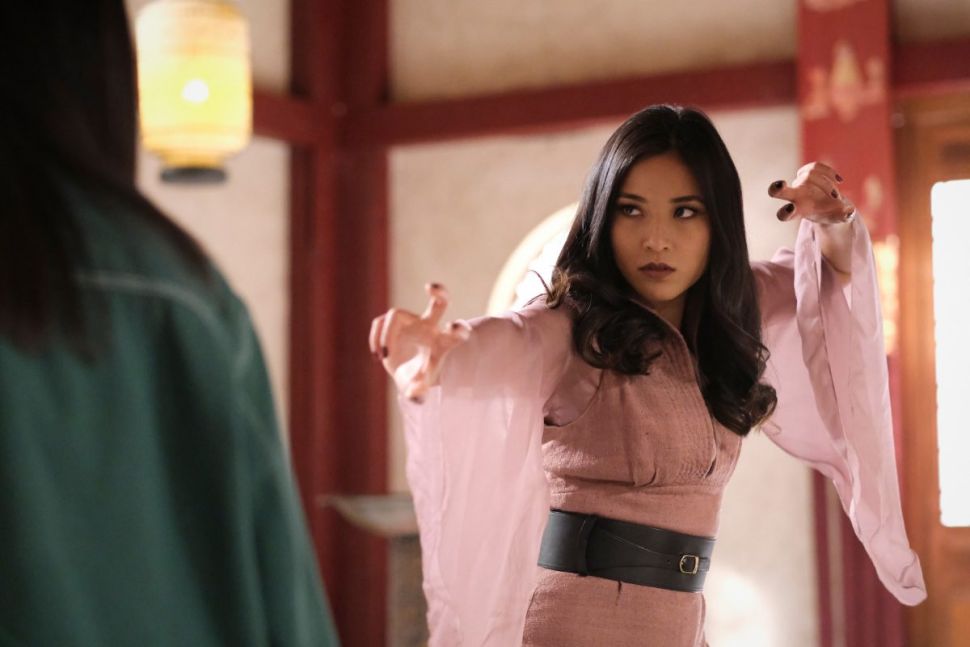

Yvonne Chapman as Zhilan in the Season 1 finale, “Transformation.†Bettina Strauss/The CW
Do you think a villain like Zhilan can still be redeemed?
Chapman: Yeah, I think so! I think her motives were understandable, but her morals and means of accomplishing what she deems right are very misguided. And I hope that through her, even though what she’s done is arguably horrendous, we can show that people have the capacity to change their minds and hearts if shown grace and love.
Eddie Liu: We have to believe that people can be redeemable. It’s hard to see in real life, and it’s very topical too because we see it in a lot of public figures who we feel may be terrible, and we’ve written them off and we feel like there’s no chance for redemption. However, with a character like Zhilan, they’ve laid down such amazing character development, and you see where she’s coming from and you see that she’s not Nicky and she doesn’t have that support system. And basically, what I’m trying to say is we love Yvonne so much that she has to be redeemable. If she can’t, nobody is. And also, I owe her a bottle of whiskey, so she needs to come back. (Laughter.)
What has it been like to work with a seasoned stunt team, who choreograph these fight sequences like little dances?
Liu: When we first got to Vancouver last March to start the pilot, it was basically like kung fu camp. We each had various levels of experience, but regardless of what our background was, the stunt team just took us in and was able to teach us from the very beginning. They’ve been such wonderful instructors. The show’s literally called Kung Fu, so there’s immediately this sort of pressure to deliver on the action front. And at the same time, we’ve been able to, after certain episodes, find our own levels of personal style within our characters’ fighting styles. It’s been immensely hard work — but so rewarding. Every time we shoot a fight scene, it takes all day long, and everything’s crazy, and it seems like there’s no time to do anything [else]. But we always get it done, and I’m always looking around in the middle of a cyclone, and I’m like, “Holy crap, I’m having the time of my life here.â€
Vanessa Kai: I echo all of that. We have such a world-class stunt team, not only in the choreography, but also from an acting perspective. They look at all styles, who specializes in what, so it feels very character-driven as much as it is about the intentionality of the moment and the crescendo of the fight scene. It’s a marriage between the martial arts and performing arts.
How much of the stunts would you say are done by yourselves and how much are left to the stunt doubles?
Liu: Oh, let’s see… Definitely the wire stuff, that’s all them. A bunch of these guys had just come off of the Snake Eyes movie right before [our show], so we’re talking about the highest calibre of Hollywood productions in terms of talent. They let me do most of my fighting. (Gavin Stenhouse laughs.) They’re like, “Oh, Eddie will have his turn. That’s great.†And then [my stunt double] Ken [Do] will jump in. I get to do most of it, but as far as the falls and the dangerous stuff, there’s a reason why we have a stunt team. But even when we get to be onscreen and do it ourselves, there was a whole village behind that that taught us where to put our arms and how to bend our elbows and made sure we were doing what we were supposed to.
Stenhouse: What about vase catching, Eddie? (Laughs.)
Liu: Vase catching? Oh. Okay, the shortest of anecdotes regarding the vase: So my double Ken did the leap, and I did the close-up because they need my face in it. And apparently, I found out I’m not very good at falling from two feet off the floor because that knocked the wind out of me, and that part was not fun. I wouldn’t brag about doing my own stunts, because that part hurt.
Gavin, in the last two episodes of the season, a switch seems to go off in your character, Evan, after he discovers that the D.A. is working for Russell Tan. How would you say this affects his innate quest for justice, given what he wanted to do going into the justice system?
Stenhouse: That’s a really interesting question. I think that, over the course of the first season, Evan’s holding onto his moral compass in terms of believing that he is in the right area to make a change from within the system. But you see, time after time, episode after episode, he just keeps getting repeatedly denied and increasingly frustrated. And at the same time, his best friend Nicky and Henry are getting stuff done in a grey area of the law, so he is confronted with that and realizing perhaps that the strategy he’s been taking up until now is not as effective as he would like. And I think, certainly, in this last episode, you really see a new life in Evan in terms of the possibility of where he could be going down the slippery slope, given the perspective that he has after hanging out with Nicky a lot.
Jon, when you compare where your character, Ryan, is at the start of the season to where he is at the end of the finale, it’s like night and day. He’s reconciled with Nicky (his closest confidante), he’s made peace with his parents, and he’s just gone through his first serious relationship. How does his relationship with Joe (Bradley Gibson) and reconciliation with his loved ones ultimately help him to discover his place in the world?
Jon Prasida: Yeah, man, you’ve kind of hit the nail on the head there with that summary. It’s sort of come full-circle where Ryan is at peace. I really love how we did explore going through a relationship and then it ending as well — well, open ending, maybe? Who knows? I really like how Ryan got to experience all of that.
Did your heart drop like mine did when you found out that Ryan and Joe would be breaking up?
Prasida: Yes, definitely. And from an acting perspective, I really love having Bradley as a scene partner and to be able to be vulnerable with that man. We just have a trust for each other, and then knowing that Joe [was like], “Oh, I’ve got to go.†I was like, “Oh no!†So I was heartbroken in two senses: one for Ryan and another for myself.
https://www.youtube.com/watch?v=YU8CZ2sVH44
For the showrunners: Have we seen the last of Joe? Could he come back in the future?
Berens: I’ll jump in and say that that was a case where we actually planned for Joe to run through the entire season as Ryan’s love interest. And it’s a case that, particularly under COVID with the two-week quarantine [in Canada for international travelers], [Bradley] was working on another show, and it just became a conflict where there was no way to bring him back, except for one episode. We were heartbroken to lose Bradley, because we loved him so much. But we kind of had two choices: (1) “Oh yeah, Joe’s just off screen for three episodes and the finale†or (2) lean into the fact that we had lost Bradley for the rest of the season and make a story out of it.
As sad as we were that that relationship ended sooner than we had planned, I think it actually helped us foreground Ryan’s relationship with his parents. I think, by the break of episode 11, we realized that it was the right direction to take, even if it was not our first choice. Getting to see that vulnerability from JP was kind of a trade off. It was so beautiful that, ultimately, we think it was the right story to tell.
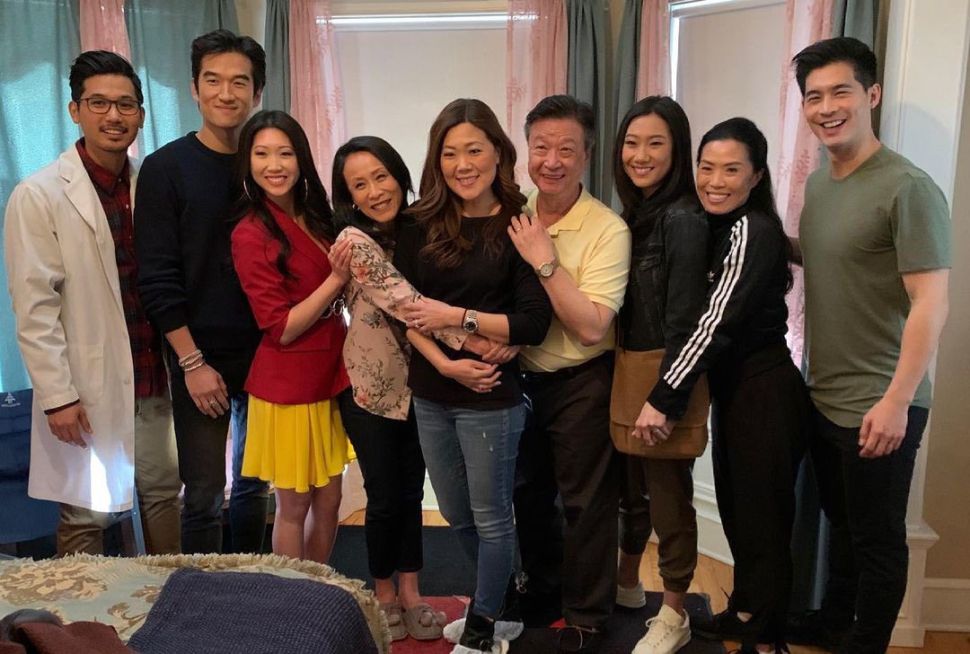

The cast of Kung Fu Handout
Shannon, there are many people in this Space who would consider you one of the breakout stars of 2021, with your beautifully layered portrayal of Althea, who presents as this larger-than-life older sister but is actually hiding this secret about her sexual assault. What has it meant to you to bring that heartbreaking but important storyline to life?
Shannon Dang: Oh, wow. (Chokes up.) That’s news to me! Anyways, I think it’s weird to see I’m grateful, but when I was first approached about this subject matter, Christina and I had talked during the pilot, and that’s when she told me about where Althea’s character was going. At first, I was really nervous. Because, of course, with this important and sensitive subject matter, there can be a lot of pressure. We want to get it right. We want to speak truth to this subject. So I felt a lot of pressure, but I felt very inspired and motivated to tell this story. I’ve heard from some people that they really resonated with Althea’s story and her voice, so that means a lot to me, and to be able to give that to audiences is really rewarding.
https://www.youtube.com/watch?v=vpNfp8AKn8g
How does Althea lean on the people in her life and build up the courage to speak out against her former boss?
Dang: I actually love the contrast that Althea has with her sister Nicky. Nicky, throughout the whole season, is very brave and always uses her voice to stand up for justice and stand up for others. Meanwhile, her sister is not the same. She’s hiding this deep, dark secret and struggles to find her voice, so I think it was a really nice contrast to have Althea look to her sister for inspiration to find her voice and find that bravery.
In the finale, Althea marries her fiancé Dennis (Tony Chung), who is this seemingly perfect guy who, up until now, does not have any skeletons in his closet. Christina and Bob, what can you preview about Dennis’ arc in Season 2?
Kim: We have a lot of ideas for Dennis. Dennis has a big, powerful extended family, and I think there’s a lot to explore there. They’re kind of a fun foil to the Shen family. But we love that Dennis is kind of perfect. There was a beauty to that because oftentimes, you don’t see that. But there are layers for sure to come.
Berens: I think we found something in Dennis in the way that Tony played him. Althea’s storyline was so dark and so raw, and it felt to us that having Dennis there as this balance and this wonderful rock for her, it helped to balance out the tone of her story this season. Certainly, there were conversations about a skeleton in his closet, but we couldn’t bring ourselves to do it. We sort of fell in love with their chemistry, and there are surprises ahead. But as you can see in the finale, he’s been looped into the status quo of Nicky and her siblings and what they’ve been up to. I think you can expect to see him participate in the Scooby gang shenanigans next season, so that’s one thing to look forward to.
Tony, do you think marriage — and this knowledge about the Shen family’s birthright — will change his dynamic with Althea at all?
Tony Chung: Definitely. I think to what extent is what we’ll see in Season 2. I think it’s gonna be a whole thing to learn about this entire other side of the Shen family. It’ll be interesting to see how Dennis, this seemingly perfect guy, will react, because it’s definitely going to rock his world.
https://www.youtube.com/watch?v=VEvpuUeLVuA
Tzi, you proudly hold the title of being Hollywood’s go-to Asian dad, but Jin is certainly different from the other father figures that you have portrayed in the past. How refreshing has it been for you to play such an affable and caring father and husband this time around, while also portraying Jin’s shortcomings?
Tzi Ma: It was a conspiracy, that’s what it was. (Laughs.) It was something that was planned, discussed and executed with Christina, Bob and myself. We really wanted the near-perfect dad for Asian dads to look at and say, “You know what? We want to strive to be that dad.†It’s been a pleasure to explore Jin, and there’s so much more for us to really discover with the audience later on. I think it’s something that I’ve always really thought about doing because I’ve [played] so many [dads] lately that are so tormented, tortured and fractured and have relationships with their children that are not so great and somehow come out on the other side of the tunnel with all of these battle scars. I think, for Jin, that’s something that he needs to enjoy and embrace as a dad. It’s a little bit of a rejuvenation for myself [after] playing all of the other ones that have gone through so much.
Kheng, over the course of the season, we discover that Mei-Li and her daughter Nicky are more alike than they are different and there are some secrets that cause marital issues for Mei-Li and Jin. How do the events of this season ultimately influence the wife and mother that she becomes by the finale?
Kheng Hua Tan: It’s very interesting how the finale is called “Transformation†because when I look at my own life and when I look at my time working on Kung Fu, I feel that there are parallel transformations that are going on. Being away from my own family and being a part of the Kung Fu family, these two aspects basically really, really transformed me as a person and they fed into one another. Every time I missed home, I would find a love that I found with the Kung Fu family and [it] made me understand Mei-Li’s heart better. My real life and my life as Mei-Li grew in tandem, and I am truly transformed after this entire period. And now that I’m back in Singapore in my real life, I am constantly reminded of how deep and wonderful this transformation is.
I would like to explore all sorts of different sides of Mei-Li, and I really thank the entire team for giving me so much scope to really bring Mei-Li up and down. And even though I don’t do physical somersaults, I loved having done emotional somersaults. I do think Mei-Li has gone through quite a lot of yang in the first season, because I think she was fighting a lot of things. I would really love to explore a more yin side of Mei-Li in Season 2 because, I guess, she really lives in me. And just like how I attack my life from so many different angles, Mei-Li’s gonna be part of my life for a while, and I want to give her that same sort of attack. I want to see dark and light sides. I want to see funny sides. I even want to see sexy sides! I want to see all sorts of sides of her. (Laughs.)
A show like Kung Fu doesn’t necessarily have the responsibility to tell stories outside the Asian community, but the fact that you made an ambitious attempt to highlight Black-Asian solidarity in episode 5 means that there is a certain responsibility to get it right when you do. What kinds of conversations did you have to ensure that you accounted for a variety of perspectives and to get your message across?
Liang: I think we were all very eager to do it right because it was happening at such an eerily, poignant time for an episode like that, given the year that we’ve had where Black Americans and Asian Americans have really been pitted against each other. So we wanted to show that solidarity and we wanted to do it right. And we also wanted to make sure that we weren’t solving anything, that it’s going to be an ongoing effort. I think, as a cast, we talked about the unique opportunity we had as an Asian cast to tell this story through this lens, and I really love what Christina and Bob and A.C. [Allen, who wrote the episode] did in showing the different generational perspectives on racism in America. You got to see Jin and Mei-Li’s perspective, as well as the Shen kids. It was a big episode, but I think we’re all really proud of the outcome and how it turned out.
Olivia, Eddie and Gavin, it’s not very often that you get a love triangle that seems to have more mature conversations than unnecessary angst, especially on a network like The CW. Those relationships are certainly evolving and there’s no telling what next season could hold, but what was it like to toy with that storyline for so long and to have it come to a somewhat natural conclusion?
Liu: Look, toxic masculinity is so passé.
Stenhouse: Who’s talking about conclusions here?
Liu: Oh, excuse me, excuse me. I have the mic now, Gavin. (Stenhouse laughs.) Thank you. Before we started actually filming these episodes, we knew that this was gonna be the triangle, and we would have to explore it, right? And I just love the road that we went down because we know that they’re good guys, they have the best of intentions, they really love Nicky and they care about her well-being. So to see a healthy version of that conflict was really refreshing for me, because we always get very toxic, yucky and messy situations. And it’s nice to see something much healthier for a change.
https://www.youtube.com/watch?v=BcVLkzBcs-I
Stenhouse: I also want to hear about what it was like for Liv to be in the middle of it all, in terms of being dragged left and right or right, right, right. (Laughs.)
Liu: Yeah, Liv, tell us! (Laughter, followed by a long pause.) Olivia’s uncomfortable.
Liang: I’m uncomfy. Love triangles are new storylines for me as Olivia getting to play a character because the leads get the love triangle. So it was very refreshing to finally offer that an Asian woman could possibly be desirable in this way, and also have her own voice in it and make her own choices and not be so swayed by just good looks and charm.
Liu: Thank you. (Laughter.)
Liang: I love that it naturally became a very mature ending with an asterisk to Evan and Nicky, and Nicky kind of exploring this new thing [with Henry], which has kind of been a theme for her this season. But we’ll see… It was fun to have two charming, young men vying for… Nicky. (Laughter.)
Stenhouse: Also, as fun as it was shooting those scenes, my favorite part was watching them back. The scene would play out and it would just be so cringe, and you’d identify with Nicky’s position and you’d just find yourself being like, Ooh, that’s awkward! And you’d always get the last little button at the end of the scene of Nicky’s face going, Okay, we’re doing this. (Liang laughs.)
Liu: Yeah, right before we went on the road trip, and then also the moment that Henry and Evan meet for the very first time, and you can just see in the way Olivia plays it where she’s just dying inside. It’s just so much fun.
https://www.youtube.com/watch?v=npduK0OD1Kk
Liang: Yeah, the first time Henry and Evan meet in the training room. That scene was actually a lot longer when we shot it, and the guys were playing with a lot of different ways of how to meet each other, and whether it would be like two machismo guys trying to size each other up, or if it was going to be very friendly. It was really fun to shoot that scene, because the awkwardness was quite palpable that day, and that scene went on forever, it felt like.
Stenhouse: Yeah, get Eddie and I peacocking at each other, and we’ll be there for days. (Laughter.)
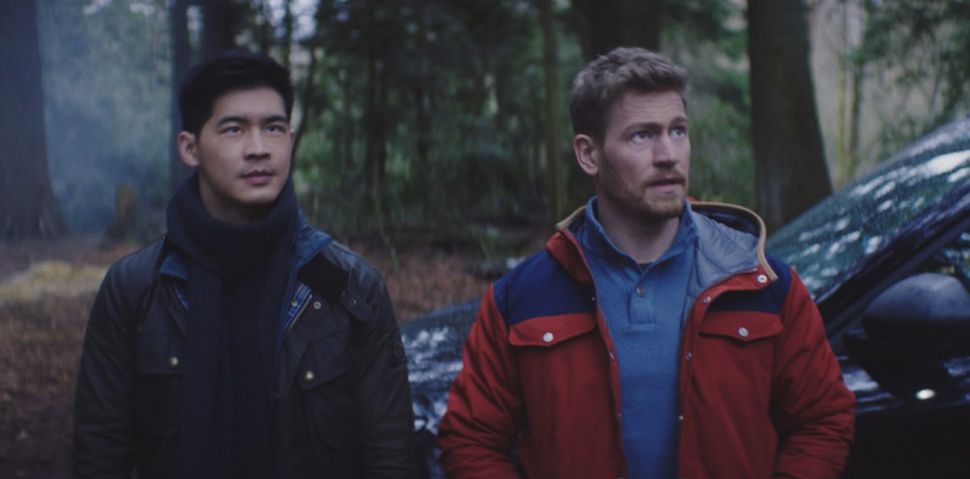

Eddie Liu as Henry Yan and Gavin Stenhouse as Evan Hartley in “Isolation.†The CW
What is one thing that you would like to see from your characters next season? Could some people get more into martial arts?
Stenhouse: I want to see Evan get gritty and ambiguously law-unabiding.
Dang: I would love to see all of the Shen family get in on the action and become the Incredibles and call us the Shencredibles or something. (Laughter.)
Prasida: I second that!
Tan: Yes!
Dang: Speaking into existence…
Ma: I better start training now. Man, my aching back… (Laughs.)
Chung: I would love to see Dennis get involved with bitcoin and cryptocurrency. (Laughter.)
Liu: Speaking of skeletons in Dennis’ closet, I want to see him go big on dogecoin, and then it drops, and then he’s gonna start to wonder, Oh my God, is Althea gonna divorce [my] ass? (Laughter.)
Christina and Bob, you are slated to return in the 2021-22 midseason, and you’ve certainly left us with more questions than answers. We have the revelation that Kerwin (Ludi Lin) is still alive after being stabbed by Zhilan, Mei-Xue has a daughter that is “the key to everything,†and Russell Tan seems to be the new big bad for Nicky. What can you preview about the second season?
Berens: The new status quo is very clear from our cliffhangers at the end of the season. The only thing I’ll tease is I think the new Nicky we see at the end of the episode, the happy Nicky, we want to live with that for a little bit before we pile on the trauma, conflict and drama. I can say that we’ll be starting on a light note for her as the dark forces start to align yourselves, so we want to see Nicky having some fun at the top of the season and really feeling her oats. Now that she’s healed her family and her siblings are sort of on her team, I think it’s going to be a fun, poppy start before it gets dark and dramatic. So that’s about all I can say right now.
Kim: Yeah, I think, for us, we just love you guys. Our cast is so wonderful. We want more family, more romance, way more action too, so more of the good stuff, and we’re excited that the story is a little bit more centered now, especially to begin. When Bob and I talked about Season 2, we felt very lucky in that it’s not an “oh God, what are we gonna do?†It’s like, “Oh, we have so much we have to figure out what we want to do out of all of these ideas.â€
The entire first season of Kung Fu is streaming on the CW app or CWTV.com in the U.S., and on the CTV app or CTV.ca in Canada.

//platform.twitter.com/widgets.jshttps://platform.instagram.com/en_US/embeds.js
